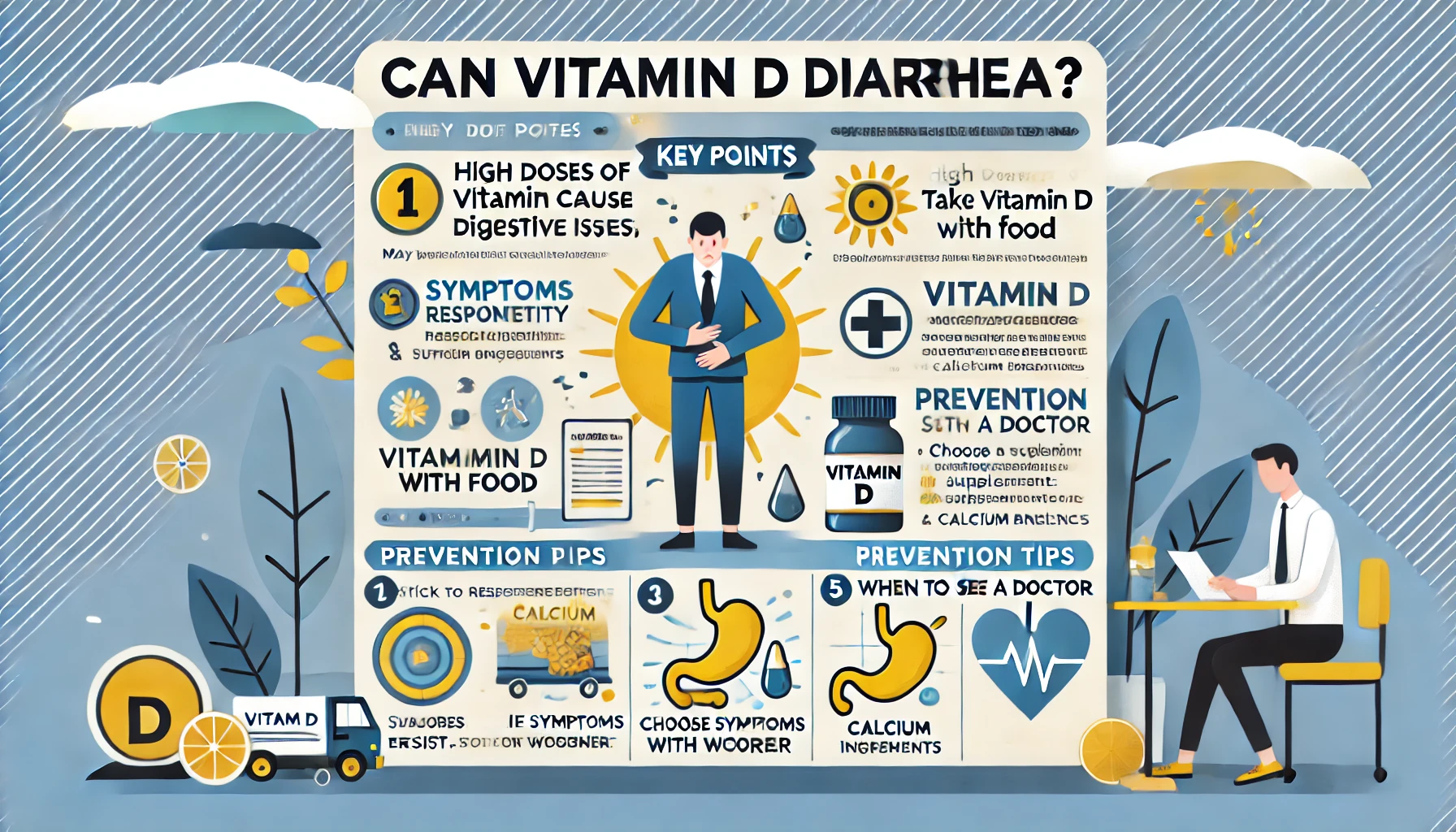Side Effects Of Prenatal Vitamins When Not Pregnant – Everything You Need To Know!
March 24, 2025
Can You Take Vitamins On A Plane – A Complete Travel Guide!
March 28, 2025Vitamin D is an essential nutrient that supports bone health, immune function, and overall well-being. However, some people experience digestive issues after taking vitamin D supplements, leading to the question: Can vitamin D cause diarrhea?
In this article, we’ll explore:
✔ How vitamin D affects digestion
✔ Possible causes of diarrhea from vitamin D
✔ Who is most at risk
✔ How to prevent side effects
Let’s dive in!
Can Vitamin D Cause Diarrhea?

Yes, high doses of vitamin D can sometimes cause diarrhea in certain individuals. While vitamin D itself does not typically cause digestive problems, excessive amounts may lead to stomach discomfort, nausea, and loose stools.
Diarrhea from vitamin D is usually linked to:
🔹 High doses of supplements – Taking more than the recommended daily amount
🔹 Vitamin D toxicity – Overloading the body with too much vitamin D
🔹 Sensitivity to ingredients in supplements – Some vitamin D products contain fillers, additives, or oils that can trigger digestive issues
Let’s break down the reasons in more detail.
Why Does Vitamin D Cause Diarrhea in Some People?
1. Taking Too Much Vitamin D
The recommended daily intake of vitamin D varies by age:
- Adults: 600–800 IU per day
- Safe upper limit: 4,000 IU per day
- Toxic levels: Over 10,000 IU per day (long-term use)
Excess vitamin D can lead to hypercalcemia, where calcium builds up in the blood. This may cause:
✔ Stomach pain
✔ Nausea and vomiting
✔ Frequent urination
✔ Diarrhea
If you are taking a high-dose vitamin D supplement, it’s essential to monitor for side effects.
2. Vitamin D Toxicity (Hypervitaminosis D)
Vitamin D toxicity occurs when too much vitamin D accumulates in the body, leading to an imbalance of calcium levels. This can irritate the digestive system and cause:
❌ Diarrhea
❌ Nausea
❌ Kidney issues
❌ Dehydration
Toxicity is rare but usually happens when someone takes very high doses (10,000 IU or more) for extended periods.
3. Sensitivity to Vitamin D Supplements
Some people experience digestive upset from certain types of vitamin D supplements. This may be due to:
🔹 Artificial additives and fillers – Some supplements contain preservatives or binding agents that may irritate the gut.
🔹 Oil-based formulas – Vitamin D is fat-soluble and often combined with oils like MCT oil, coconut oil, or soybean oil, which may cause diarrhea in sensitive individuals.
🔹 Lactose or gluten – If you have an intolerance to lactose or gluten, check the supplement label for hidden ingredients.
4. Interaction with Other Medications
Vitamin D can interact with certain medications, affecting how the body absorbs and processes it. Some medications that may cause digestive issues when taken with vitamin D include:
💊 Calcium supplements – High calcium intake alongside vitamin D may cause an imbalance, leading to diarrhea.
💊 Magnesium supplements – Some magnesium forms (like magnesium citrate) have a laxative effect.
💊 Medications for heartburn or acid reflux – Proton pump inhibitors (PPIs) may impact vitamin D absorption and digestion.
If you are on medication and experience diarrhea after taking vitamin D, speak with your doctor.
Who Is Most at Risk for Vitamin D-Related Diarrhea?
Certain people may be more likely to experience diarrhea from vitamin D, including:
✔ Those taking high-dose supplements – Mega-doses can overwhelm the digestive system.
✔ People with gut disorders – Individuals with IBS, Crohn’s disease, or lactose intolerance may be more sensitive.
✔ Individuals with kidney problems – The kidneys help regulate vitamin D and calcium balance.
✔ Those with hypercalcemia risk – High blood calcium levels can lead to digestive discomfort.
How to Prevent Diarrhea from Vitamin D
If you experience diarrhea after taking vitamin D, try these solutions:
1. Stick to the Recommended Dosage
💡 Adults should take 600–800 IU per day, unless advised otherwise by a doctor.
🚫 Avoid exceeding 4,000 IU per day unless prescribed.
2. Choose High-Quality Supplements
✔ Opt for clean-label supplements without additives or fillers.
✔ Consider liquid drops or capsules instead of oil-based soft gels if you have a sensitive stomach.
✔ Look for third-party tested products to ensure purity and quality.
3. Take Vitamin D with Food
✅ Taking vitamin D with a meal (especially one that contains healthy fats) can improve absorption and reduce stomach irritation.
4. Get Vitamin D from Natural Sources
🌞 Sunlight exposure – 15–30 minutes a day can boost vitamin D naturally.
🥛 Foods rich in vitamin D:
- Fatty fish (salmon, tuna, mackerel)
- Eggs
- Fortified dairy products
- Mushrooms
5. Stay Hydrated
If you develop diarrhea, drink plenty of water and electrolytes to prevent dehydration.
Also Read: Side Effects Of Prenatal Vitamins When Not Pregnant – Everything You Need To Know!
When to See a Doctor
If you experience persistent diarrhea, stomach pain, or other side effects, consult a doctor. Seek medical help if you notice:
🚩 Severe diarrhea lasting more than 2 days
🚩 Signs of dehydration (dry mouth, dizziness, dark urine)
🚩 High calcium levels (kidney pain, confusion, fatigue)
Your doctor can check vitamin D and calcium levels through a simple blood test.
FAQ’s
1. Why does taking vitamin D give me diarrhea?
Vitamin D can cause diarrhea if taken in high doses or if your body has trouble absorbing it properly. Excessive vitamin D increases calcium levels, which can irritate the digestive system. Additionally, some supplements contain fillers, oils, or additives that may trigger stomach discomfort.
2. What are 5 physical signs you’re taking too much vitamin D?
Taking too much vitamin D can lead to toxicity (hypervitaminosis D). The five common signs include:
1️⃣ Diarrhea or stomach pain
2️⃣ Nausea and vomiting
3️⃣ Frequent urination and thirst
4️⃣ Weakness or fatigue
5️⃣ Confusion or dizziness
If you experience these symptoms, consult a doctor and lower your vitamin D intake.
3. What are the side effects of taking vitamin D tablets?
Most people tolerate vitamin D well, but possible side effects include:
✔ Digestive issues (diarrhea, nausea, bloating)
✔ Headaches or dizziness
✔ Increased thirst and urination
✔ Muscle pain or weakness (due to high calcium levels)
✔ Kidney problems in extreme cases
4. What happens if I take 5000 IU of vitamin D3 every day?
Taking 5,000 IU daily is above the recommended daily intake but below the toxic limit (10,000 IU) for most adults. While some people may need this amount for deficiency, long-term high doses can increase calcium levels, potentially causing diarrhea, nausea, and kidney stress. It’s best to monitor vitamin D levels with a doctor’s guidance.
5. How can I prevent diarrhea when taking vitamin D?
To avoid diarrhea and stomach discomfort, follow these tips:
✔ Take vitamin D with food to improve absorption.
✔ Stick to the recommended dose (600–800 IU daily).
✔ Choose high-quality supplements without additives.
✔ Drink plenty of water to stay hydrated.
✔ Get vitamin D from natural sources like sunlight and food instead of high-dose supplements.
If you still experience side effects, consult a healthcare professional for personalized advice.
Final Takeaways
Vitamin D can cause diarrhea in some people, especially when taken in high doses. This may happen due to toxicity or certain supplement ingredients that affect digestion. To avoid issues, it’s best to stick to recommended doses and choose high-quality supplements. Getting vitamin D from food and sunlight is a natural way to prevent side effects. If symptoms persist, always consult a healthcare professional. By managing your intake wisely, you can enjoy the health benefits of vitamin D without discomfort!




